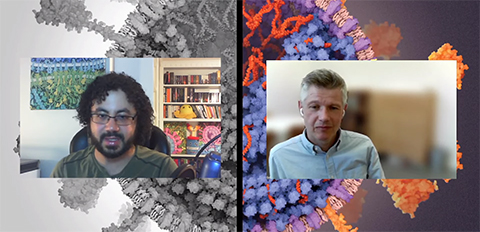Advocating for change in science
Advocating for change in science ASBMB Today


Incorporating Sustainable Development Goals (SDGs) in Science Advocacy: The Impact of the Advocacy Training Program
In his job at a pharmaceutical firm, Daniel Wilson works on using adenoviruses and adeno-associated viruses to deliver gene therapies. On weekends, he crafts episodes of “Debunk the Funk with Dr. Wilson,” a YouTube series aimed at refuting myths about vaccines.
Advocacy Training Program (ATP): Driving Positive Change in Science Policy
For his series, Wilson draws on his experience in the first Advocacy Training Program in 2018. The ATP, an externship of the American Society for Biochemistry and Molecular Biology, educates participants about government and public affairs and offers guidance on persuasive writing and speaking. The program engages young scientists in advocacy to drive positive change in science policy.
Wilson’s videos offer fact-packed slide talks and interviews to quash public health myths. Recent episodes touch on such claims as DNA contamination of mRNA vaccines and childhood vaccine links to autism.
“Your work has been a port in the storm of misinformation,” a fan named David wrote on the site.
Wilson began his show in 2020, inspired in part by his past internet forays. In his early teens, he drifted online, drawn by claims of 9/11 plots and pseudoscience, “sucked into misinformation and conspiracy theories,” he said.

YOUTUBE
In a June episode of “Debunk the Funk with Dr. Wilson” titled “Vaccines don’t cause autism (duh),” ATP alumnus Daniel Wilson, at left, talks to Danish scientist Anders Hviid of the Statens Serum Institut.
High school and college biology teachers gave him a fresh frame of reference. “I discovered how incredible the scientific community is and how powerful the scientific method can be,” Wilson said.
He decided the internet could be a tool for changing minds. “Debunk the Funk,” which has some 32,000 subscribers, became his fulcrum for change.
“I try to use what I learned in the ATP to deliver a concise and effective message,” Wilson said.
Building on skills, experience
Scientists bring special strengths to advocacy, observes Raechel McKinley, ASBMB science policy manager, and an ATP coordinator for the past two years.
“The fact that they’re all data driven, making sure that all their points are backed by evidence … that’s one of the strengths that scientists bring to the policy space,” McKinley said.
The ATP builds on participants’ knowledge and experience. Through online lectures, breakout discussion groups and individual projects, they gain information and basic skills for driving change.
Trainees learn about the federal agencies that fund research and the federal policies that govern it, the congressional budget process and policy at the state level. Program organizers strengthened this portion of the ATP for the 2023 session.
“We made a big effort to add more material, so that people have a common understanding of U.S. government policy and politics,” Neote said.
Bailey Weatherbee liked the way her 2018 ATP training parsed the process for research grants from federal sources such as the National Science Foundation and the National Institutes of Health.
“It’s easy to talk about all the things that you want to change,” Weatherbee said. “It’s more difficult to know where you go to do that.”
ATP folds in practical assignments such as crafting a succinct research description, or “elevator pitch,” and a publishable op-ed.
For the trainees, the biggest challenge is often finding the right tools to realize the policy changes they seek, McKinley said. She uses words like “attainable” and “sustainable” to describe the optimal projects.
“We want all of the delegates to get something tangible out of this,” McKinley said. “In a sense, we have to help them find the right scale for change.”
Dan Pham, a former ASBMB science policy manager, helped launch the program in 2018. The ATP’s founders called its trainees “delegates” to signal the importance of their role in promoting science on federal, state and local stages.
“We wanted to convey to participants that they were more than interns,” said Pham, now a director at the Milken Institute Center for Strategic Philanthropy, “that they were representing something — firstly ASBMB but also their ideas and needs.”
Simplifying the science message
Biochemistry students are trained to convey complexity, but effective advocacy calls for the opposite mindset, ATP leaders and alumni say. Pham touts the practical value of a succinct message.
“For politicians, currency is time: If you have 30 seconds in the elevator, you have to get to the point,” he said. “We’ve been trained to do the exact opposite.”
Weatherbee worked with Pham as a delegate. Five years after ATP, she remains committed to raising her voice for science.
“It’s so important for scientists to be advocates because we tend to historically silo ourselves away from the rest of society in a way that I think has been damaging,” she said. “I think we’re seeing that in the spread of misinformation now, in the response to vaccinations and COVID-19.”
She credits ATP with helping her hone her communication skills for public debates on science-linked issues.
“When it comes to advocacy, you cannot be wishy-washy,” Weatherbee said. “You have to be very strong in your positions … and I think a lot of times, scientists are nervous to be definitive in their positions, because we are trained not to be.”
Weatherbee views the ATP as a singular opportunity.
“There are not a lot of programs out there to give scientists the skills to engage effectively,” she said. “The ATP is one of the first and remains one of the only ones that prioritize that.”
Marvin “Cortez” Bowlin is a University of Alabama grad student and a 2022 ATP delegate. Five years earlier, he had
SDGs, Targets, and Indicators
SDG 3: Good Health and Well-being
– Target 3.8: Achieve universal health coverage, including financial risk protection, access to quality essential health-care services, and access to safe, effective, quality, and affordable essential medicines and vaccines for all
– Indicator 3.8.1: Coverage of essential health services
The article discusses the importance of debunking public health myths and promoting accurate information about vaccines. This aligns with SDG 3, which aims to ensure good health and well-being for all. The specific target under SDG 3 that can be identified is Target 3.8, which focuses on achieving universal health coverage and access to essential health services. The indicator that can be used to measure progress towards this target is Indicator 3.8.1, which measures the coverage of essential health services.
SDG 4: Quality Education
– Target 4.7: By 2030, ensure that all learners acquire the knowledge and skills needed to promote sustainable development, including, among others, through education for sustainable development and sustainable lifestyles, human rights, gender equality, promotion of a culture of peace and non-violence, global citizenship, and appreciation of cultural diversity and of culture’s contribution to sustainable development
– Indicator 4.7.1: Extent to which (i) global citizenship education and (ii) education for sustainable development (including climate change education) are mainstreamed in (a) national education policies; (b) curricula; (c) teacher education; and (d) student assessment
The article mentions the Advocacy Training Program (ATP), which educates participants about government and public affairs and offers guidance on persuasive writing and speaking. This aligns with SDG 4, which aims to ensure quality education for all. The specific target under SDG 4 that can be identified is Target 4.7, which focuses on promoting sustainable development through education. The indicator that can be used to measure progress towards this target is Indicator 4.7.1, which measures the extent to which global citizenship education and education for sustainable development are mainstreamed in national education policies, curricula, teacher education, and student assessment.
SDG 10: Reduced Inequalities
– Target 10.2: By 2030, empower and promote the social, economic and political inclusion of all, irrespective of age, sex, disability, race, ethnicity, origin, religion or economic or other status
– Indicator 10.2.1: Proportion of people living below 50 percent of median income, by age, sex and persons with disabilities
The article highlights the advocacy efforts of individuals from diverse backgrounds, including LGBTQIA+ individuals and U.S. veterans. This aligns with SDG 10, which aims to reduce inequalities and promote inclusion for all. The specific target under SDG 10 that can be identified is Target 10.2, which focuses on promoting the social, economic, and political inclusion of all individuals. The indicator that can be used to measure progress towards this target is Indicator 10.2.1, which measures the proportion of people living below 50 percent of median income by age, sex, and persons with disabilities.
Table: SDGs, Targets, and Indicators
| SDGs | Targets | Indicators |
|---|---|---|
| SDG 3: Good Health and Well-being | Target 3.8: Achieve universal health coverage, including financial risk protection, access to quality essential health-care services, and access to safe, effective, quality, and affordable essential medicines and vaccines for all | Indicator 3.8.1: Coverage of essential health services |
| SDG 4: Quality Education | Target 4.7: By 2030, ensure that all learners acquire the knowledge and skills needed to promote sustainable development, including, among others, through education for sustainable development and sustainable lifestyles, human rights, gender equality, promotion of a culture of peace and non-violence, global citizenship, and appreciation of cultural diversity and of culture’s contribution to sustainable development | Indicator 4.7.1: Extent to which (i) global citizenship education and (ii) education for sustainable development (including climate change education) are mainstreamed in (a) national education policies; (b) curricula; (c) teacher education; and (d) student assessment |
| SDG 10: Reduced Inequalities | Target 10.2: By 2030, empower and promote the social, economic and political inclusion of all, irrespective of age, sex, disability, race, ethnicity, origin, religion or economic or other status | Indicator 10.2.1: Proportion of people living below 50 percent of median income, by age, sex and persons with disabilities |
Behold! This splendid article springs forth from the wellspring of knowledge, shaped by a wondrous proprietary AI technology that delved into a vast ocean of data, illuminating the path towards the Sustainable Development Goals. Remember that all rights are reserved by SDG Investors LLC, empowering us to champion progress together.
Source: asbmb.org

Join us, as fellow seekers of change, on a transformative journey at https://sdgtalks.ai/welcome, where you can become a member and actively contribute to shaping a brighter future.







